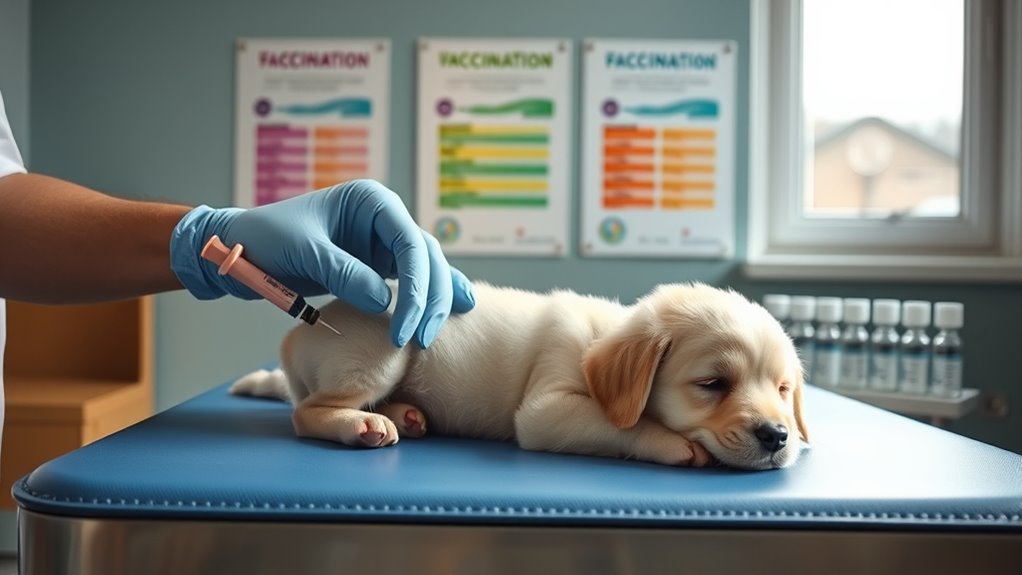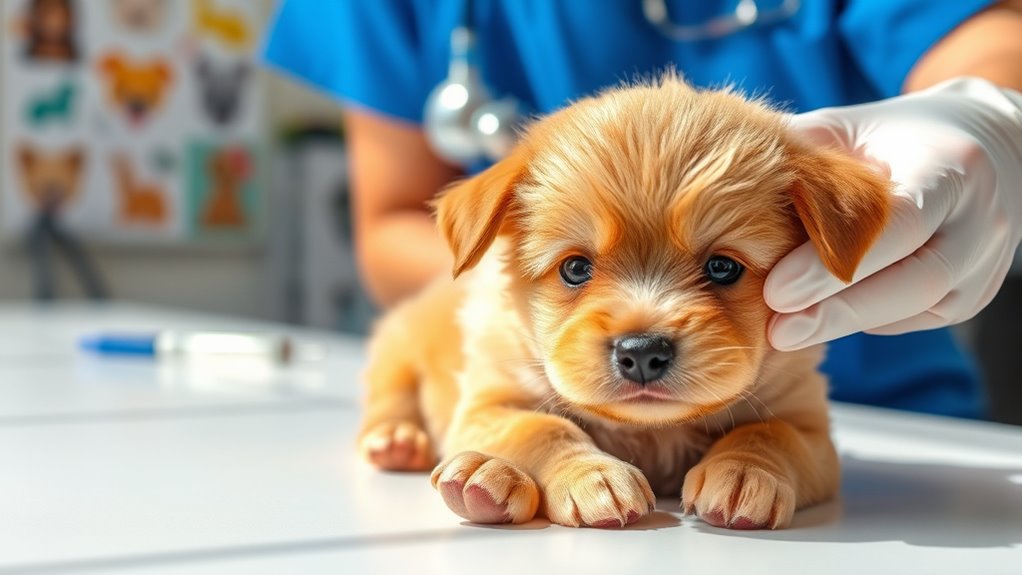Starting your puppy’s vaccination schedule early is essential for protecting them from serious diseases. Usually, vaccinations begin around 6-8 weeks old, with boosters every 3-4 weeks until they’re 16 weeks. Core vaccines cover distemper, parvovirus, adenovirus, and rabies. Non-core vaccines depend on your puppy’s lifestyle. It’s important to watch for mild side effects and stay in touch with your vet to guarantee your puppy’s health. Keep going to learn more about what to expect and when.
Key Takeaways
- Vaccinations typically start at 6-8 weeks, with boosters every 3-4 weeks until 16 weeks of age.
- Core vaccines protect against distemper, parvovirus, adenovirus, and rabies.
- Additional vaccines like leptospirosis or bordetella depend on lifestyle and regional risks.
- Mild side effects such as swelling, soreness, or low-grade fever may occur but serious reactions are rare.
- Always consult your veterinarian for a tailored schedule and monitor your puppy for any adverse reactions after shots.

Starting your puppy’s vaccination schedule early is essential to protect your new pet from preventable diseases. Puppies are especially vulnerable to various canine diseases, which can cause serious health issues or even be fatal if not prevented through proper immunization. By following a structured vaccination plan, you give your puppy the best chance at a healthy, happy life. It’s natural to have concerns about vaccination side effects, but understanding what to expect can ease your worries. Most puppies tolerate vaccines well, experiencing only mild reactions such as temporary soreness or slight lethargy. Serious side effects are rare, and your veterinarian will monitor for any adverse reactions during and after the vaccination process.
Early vaccination is vital to safeguard puppies from serious, preventable diseases with minimal side effects.
Puppy vaccinations typically start when your pup is around six to eight weeks old. During these early visits, your veterinarian will administer core vaccines to protect against serious canine diseases like distemper, parvovirus, adenovirus, and rabies. These diseases can spread rapidly and have severe consequences, so early immunization is indispensable. Your veterinarian might also recommend non-core vaccines based on your puppy’s lifestyle and local disease prevalence, such as leptospirosis or bordetella. The initial vaccines are spaced out every three to four weeks until your puppy is about 16 weeks old, ensuring that their immune system develops adequate protection. Each vaccination prompts your puppy’s immune system to produce antibodies, equipping them to fight off infections if they encounter these diseases in the future. Vaccination timing is a crucial aspect of fostering long-term immunity.
While vaccinations are indispensable, it’s important to be aware of potential vaccination side effects. Mild reactions like swelling at the injection site, soreness, or a low-grade fever are common and usually resolve within a day or or two. Some puppies might experience temporary lethargy or decreased appetite, which is normal. Rarely, more serious reactions such as allergic responses or anaphylaxis can occur, but these are extremely uncommon. Your vet will likely recommend observing your puppy for a few hours after each shot and provide guidance on what signs to watch for. Ensuring your puppy is in good health before vaccination can minimize risks, so a thorough health check-up beforehand is advisable.
Throughout your puppy’s vaccination schedule, maintaining open communication with your veterinarian is key. They can customize the plan based on your puppy’s health and environment, and address any concerns about side effects or reactions. Remember, the benefits of vaccination far outweigh the minimal risks. Protecting your puppy from canine diseases not only keeps them safe but also contributes to the health of other pets and the community. By staying proactive and informed, you’re giving your new furry friend the strongest start possible.
Frequently Asked Questions
Are There Any Side Effects From Puppy Vaccinations?
You might wonder about vaccine safety and side effects from puppy vaccinations. While most puppies handle vaccines well, some may experience mild side effects like soreness, lethargy, or brief swelling at the injection site. These symptoms are usually temporary and part of building puppy immunity. Always monitor your puppy after vaccination and consult your vet if you notice severe or persistent reactions, ensuring they stay protected and healthy.
Can I Delay Vaccinations if My Puppy Is Sick?
Delaying vaccinations when your puppy is sick might seem logical, but it risks compromising their puppy health. Just as a weakened immune system struggles to fight illness, delaying vaccination timing can leave your pup vulnerable to preventable diseases. Instead, consult your veterinarian to assess your puppy’s condition. They can recommend the best course, ensuring your puppy stays healthy and protected without unnecessary delays.
What Should I Do if My Puppy Misses a Vaccination?
If your puppy misses a vaccination dose, don’t panic. You should contact your vet promptly to discuss missed doses and arrange a vaccination catch-up schedule. They’ll evaluate your puppy’s health and determine the best way to safely administer the missed vaccine. Catch-up vaccinations are important to ensure your puppy stays protected, so follow your vet’s advice closely and keep track of upcoming doses to maintain full immunity.
Are There Any Vaccines Needed Beyond the Core Schedule?
You might need additional vaccines beyond the core schedule, especially if you’re in an area with regional diseases. Talk to your vet about these, as they can recommend vaccines for illnesses like Lyme disease or leptospirosis. These extra vaccines help protect your puppy from local health threats. Keep in mind that your vet’s advice is key to ensuring your puppy gets the right protection tailored to your region.
How Do I Handle Vaccine Reactions in My Puppy?
If your puppy shows signs of vaccine side effects, stay calm and monitor their behavior closely. Common reactions include lethargy or swelling at the injection site, but severe reactions like difficulty breathing or vomiting require immediate veterinary attention. To support your puppy’s health, keep them comfortable, avoid rough play, and contact your vet if symptoms worsen. Prompt care guarantees your puppy recovers quickly and stays healthy.
Conclusion
Think of your puppy’s vaccination schedule as a carefully planned map guiding them safely through their early adventures. By sticking to the schedule, you’re building a strong shield of protection around your pup, helping them grow into a healthy, happy dog. Consistency is your best compass on this journey. Keep up with the vet visits, and you’ll navigate these early months smoothly, ensuring your puppy’s health blossoms just like a well-tended garden thriving under the sun.










